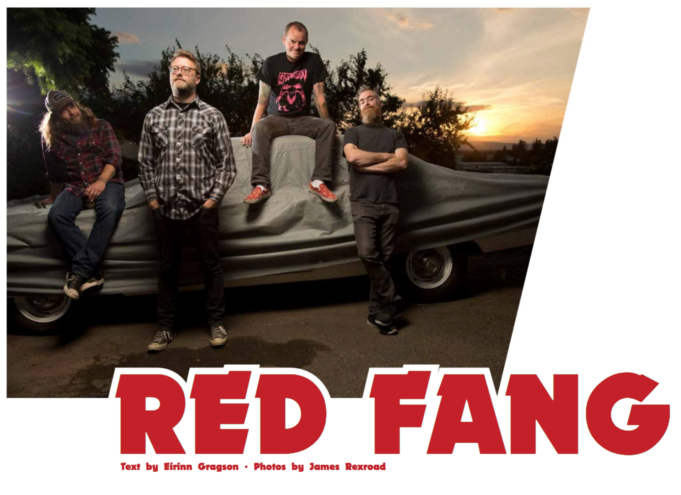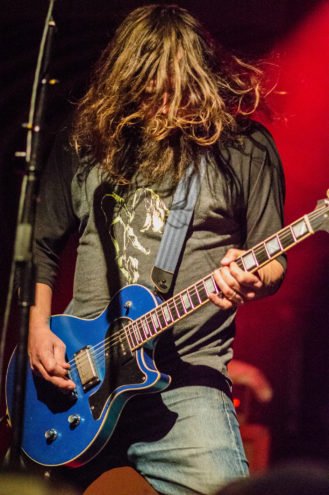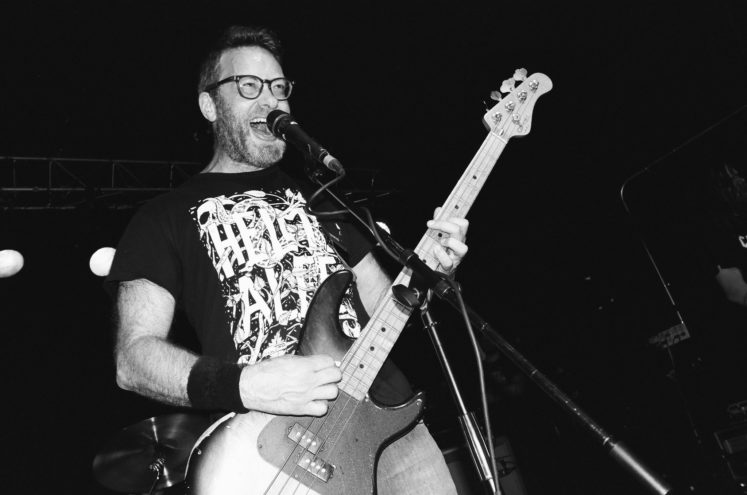Red Fang


Red Fang are a classic bunch of guys drinking beers, playing rock music and living their dream. Having spent the better part of the past 13 years crushing it onstage, Red Fang is about to embark on another cross-country tour, after which they’ll be releasing yet another killer music video in its wake. This crew of party boys made up of Aaron Beam, Bryan Giles, David Sullivan and John Sherman have been through underground shows, metal fests and even played on Late Night With David Letterman in 2014. A testament to the Portland heavy-rock scene of the 2000s, Red Fang holds that what’s most important is playing for the passion and love of the music community.
This ragtag team of metalheads sports shitty beer in each of its short-film-inspired music videos (some of which feature local musicians, comedians and even Fred Armisen). Even as world-renowned artists, Red Fang stays true to Portland by repping local venues like Dante’s and wearing Trade Up Music hats. Their songs are catchy yet trashy, loaded with headbang-worthy power chords and hard-hitting drum beats that’ll make anyone want to mosh.
ELEVEN caught up with bassist Aaron Beam and guitarist/vocalist Bryan Giles before Red Fang’s winter tour.
ELEVEN: The band started in 2005. Are you all from Portland?
Aaron Beam: None of us are from Portland; just the band is.
11: Where are you guys from originally?
AB: I was born in Seattle. My dad’s a scientist, so he got his PhD at University of Washington and then moved to New Haven shortly after that, where he did his postdoc at Yale and then he had his first professorship in Iowa. So then we moved to Iowa City and from there to Fort Collins, Colorado. I’ve been in Portland since ’91.
Bryan Giles: I was born in North Carolina, grew up in Tuscon, moved to San Diego for about five years off and on, and then I’ve been here for a long-ass time.
AB: And I think that John is probably the last [to move to PDX]. He moved here in 2000, so he’s the most recent transplant. He’s also the youngest.
11: How did you all meet each other?
AB: Through music.
BG: Mostly EJ’s specifically. EJ’s, the club on – well, it’s now Silver Linings. It’s a pawn shop on Sandy. But it was the lifeblood of our music culture back then. Went out of business in the late ‘90s.
AB: It was a strip club, and then it was a rock club, and then a strip club, and then a rock club… and then it closed and became a pawn shop. But yeah, I booked a show there for Bryan’s old band.
BG: When we were still in San Diego.
11: What was that band?
AB: Last of the Juanitas. I met David through a bunch of friends from Raleigh who came out and were going to the same college that I was at. And then John came out because he was actually playing in a band with David.
BG: That’s how I met the both of them. They were touring through San Diego and needed a show. We were living in a kind of flop house, bohemian paradise or whatever. It was an old ballet studio, so they had this huge main area, and I don’t know what they were supposed to be … dressing rooms or individual practice rooms? We had these small bedrooms around it. It was somewhere between 5-8 people living there at all times. We said “fuck it” and started putting on shows. We got a keg, and my band Last of the Juanitas played with them, and I just fell in love with their music! So their band and my band traded tours. Their band had a cult following on the East Coast, we had our cult following on the West Coast, and it was great.
11: That’s a great setup!
BG: And then when I moved to Portland, I was like, “If you ever move to Portland, you have to be in a band with me!”
AB: I think the very short answer to your question is that the music world has always been, just like with any specialized interest, pretty small.
BG: The shit we did back then, nobody cared about. It was a passion thing. We loved it and the community. We built the community around an idea, maybe a flawed idea, but it was a beautiful idea.
AB: I worked at Laika movie studio for a while, and I had to leave that job in order to do this band full time. But I was already in the music world, and you just end up meeting some more well-known people from doing that stuff. People there were just astounded that I could possibly have ever met anyone from such-and-such band. Well, just think about all the people that you know who are your idols in your world; it’s just that music is a thing that’s broader and appeals to more people than stop-motion animation does. Anything that you do is going to shrink down your world.

11: Do you remember your first starstruck encounter? Someone that you maybe idolized as a kid and then met as an adult?
AB: The first time I actually remember feeling that feeling was we got invited to play this festival that Metallica put on, on the East Coast. All of the press shit about it was, “Metallica hand-picked all these bands!” and we were like, “There’s no way!” The only way that I could possibly accept that they have any idea who we are is if one of them comes over and introduces themselves before we play –
BG: – in person.
AB: And then Chris, our tour manager, finds us before we’re supposed to go on, and he’s acting all weird and jittery. I was stretching or something, and he was like, “Um, uh everyone needs to gather over behind the stage because James Hetfield is coming over to introduce himself and say hi before you guys go on.”
11: So how would you describe your genre? I know how other people tend to describe it, but I’m curious to hear how you feel about your own style.
AB: We’re just sort of like… grunge but 20 years later.
BG: Moldy grunge.
AB: I feel like we do super short really fast songs, and we’ll do way stretched-out droney songs. We’ve never had any kind of genre in mind when we write.
BG: It really is song by song; there’s no unifying genre for the band. We don’t have a manifesto.
11: Who are some of your influences? Who’d you grow up listening to and what influences what you’re playing?
AB: As a songwriter and bass player it’s like: The Jesus Lizard, Nomeansno, Nirvana creeps in there, Big Business, Fed X (Federation X). I could go on for a very long time. Hot Snakes is another one.
11: So you’re also a guitar player, Aaron. Do you ever switch instruments? Do you ever play guitar?
AB: On the records I play guitar. But not live. I’ve been in bands that have done that, and it’s annoying. I feel like it’s annoying as a spectator and as somebody in the band. It also has a lot to do with the way we started out as a band. In my mind at least, it was a continuation of the ethos of the band that Bryan and David and John were in before Red Fang, which was called Party Time. It seemed like a band that was about, “Let’s stop playing all these super complicated instrumental math rock songs that no one can understand at all and just play music people can party to.” And only play on the weekends.
BG: My goal, I guess, was – what got me to play guitar in the first place? What made me freak out, you know? Jump up and down on my bed or start the neighbor’s trash can on fire! What was the thing that made me so crazy? And try to find that instead of trying to find what is really fun for you intellectually.
AB: I think we all ended up doing stuff that was like, “I don’t wanna get bored playing this guitar part, so I’m gonna do this three times, and then do this weird thing, and then change it and change it, and then I’m gonna have a song that has 65 parts to it.”
BG: A totally inscrutable, bizarre puzzle.

11: Do you ever get bored in Red Fang then?
BG: I don’t get bored. I just strip down my parts. Oh, you know we’re doing this thing in 4, but if we did it in 3 it’d be trippy and polyrhythmic, and I love that. But if it doesn’t serve the song, I’ll say, “I still love that, but it’s just not appropriate here.” I think that’s being older. I love to make things fucked up, but at some point I want the song to be enjoyable.
AB: That’s the thing that has replaced for me, that I need to have my guitar part change every few seconds for me not to grow bored. Focus that energy on making the song itself as strong and interesting as it can be. Then, the song itself becomes interesting and compelling, and you don’t need just your part to be interesting and compelling to yourself.
BG: Right, it’s a band, which is a group of people. It’s a group effort, which is not always easy. Sometimes it’s just playing one really boring thing, but you know the underpinnings are changing. So I’m playing one chord for a minute, but the feeling of what I’m doing is changing because of my bandmates. I think this band was the moment for me that was like –
AB: Less is more.
BG: And serve the song; don’t serve yourself. Be bored, physically, but be inspired by your ears. Is the song working? It took a long time to learn.
AB: I think one of the things that helped me get there with this band was switching from guitar to bass. Because I was pretty irritated at first. I kind of took it upon myself, sort of out of spite, to be like, “Alright I’m just going to write the stupidest bass part that I can with the idea that I want to be able to play all these bass parts five or six beers in.” I was just like, “Alright, fuckin’ bass sucks.” But I think that that made me go simpler all the time. It was ultimately for the best, and I learned something by accident.
BG: And it makes people shake their ass more!
11: The Portland music scene is pretty friendly and connected. How do you feel here?
AB: I’ve been doing it for a very long time in Portland. Having people ask me where we were from was just such a shock! When we came back from our European tour and started playing shows in town, I feel like it was very common for people to ask, “Oh dude, you guys are awesome; where are you from?” That happened all the time. That shocked me because I’ve always just been in a band that’s from the town that they’re playing in.
BG: Yeah, like the only people that are watching me is because they’re my friends in this town. They only know that it’s happening is because I told them over the phone.
11: Do you guys still wear band shirts? What’s your favorite band shirt that you have currently?
AB: My favorite one that I own is actually a Helms Alee shirt, which is a unicorn but the entire unicorn is all made out of sea creatures.
BG: There was one, a This Runs on Blood shirt, that was just black and yellow. It just said, “This Runs on Blood,” and I liked it because even if you don’t know it’s a band it’s like, “Well, I do run on blood!” So it’s just describing me!
AB: And it was tied to a really good memory.
BG: Yeah, it was a cool show. We’d been up at Flagstaff and played a show. The cops showed up, and we moved over to a house party. Kids were breakin’ stuff – pretty exciting!
AB: The cops showed up and they were like, “OK, you guys, we have to stop playing ‘cause the cops are here,” and we were like, “You’re joking, right? We just wait for them to leave and then keep playing.” No, no, no, cause Flagstaff is so small, you really do have to stop. They were like, “We really do have to stop, but it’s cool. We’ll just go over to this other, what was it called? The Shithole, or something?
BG: Something really pleasant sounding.
AB: We’re gonna go to this other place where they have house parties, The Shithole, and I think we’re all kind of like, uh… pack up all our gear and drive halfway across town? Nobody’s gonna go over there! And they’re like, “Trust us.” And we just packed it up and moved over to this other house. It took like an hour, and the whole party went over there and we just picked up where we left off, and it was crazy!
11: Lastly, who’s the brains of the music video operation? You have a lot of music videos.
BG: Whitey McConnaughy is the one who writes and directs the scripts. If you want to check out some of his other videos, they’re really good! Whiteyfilms.com. He’s got a slew of them and they’re really good.



